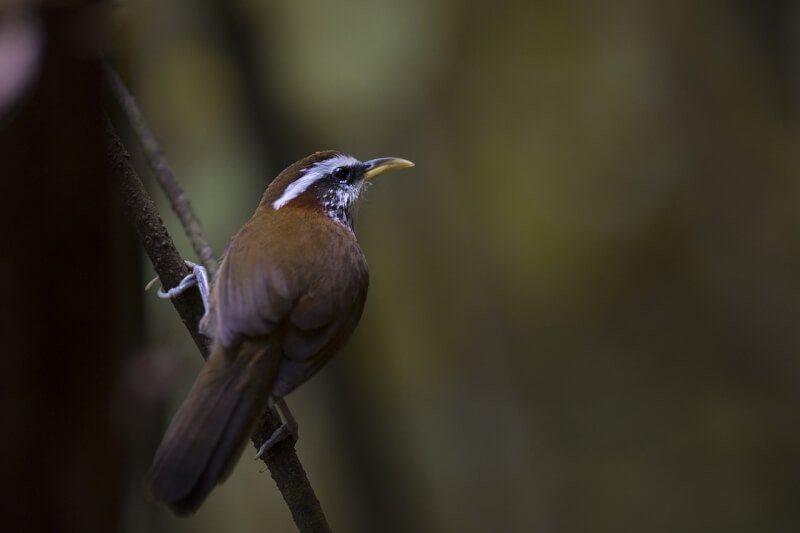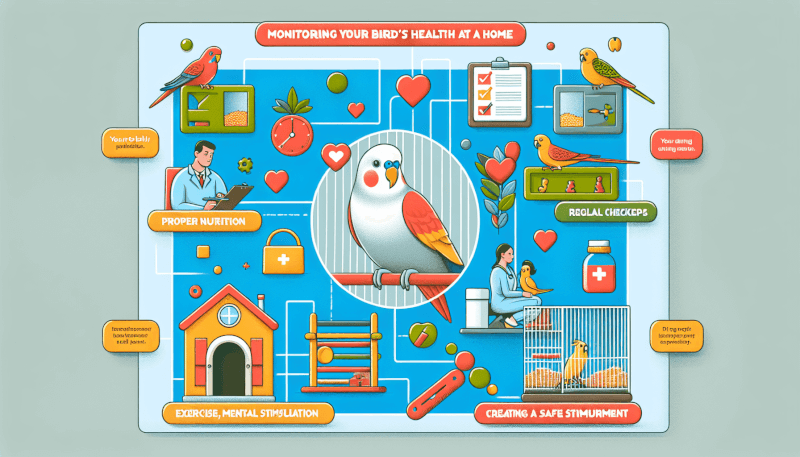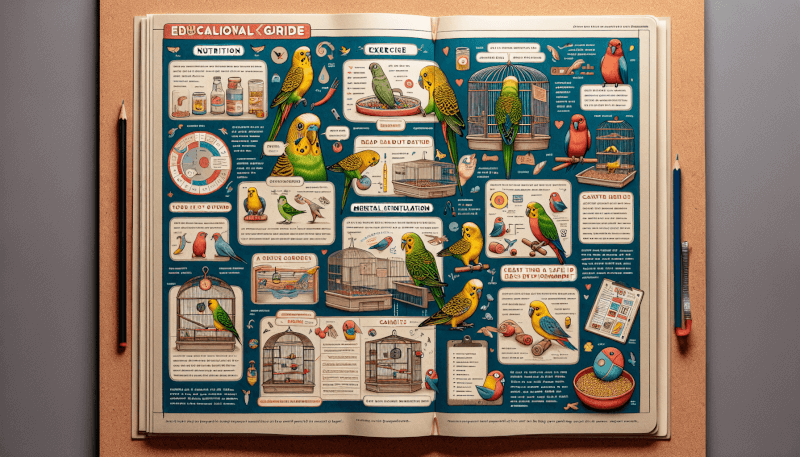Taking care of your feathered companion can be a rewarding experience, but it’s important to ensure their health and well-being. Monitoring your bird’s health at home is essential to catch any warning signs early on. From observing their behavior and appearance to maintaining a clean and comfortable environment, this article will guide you through simple yet effective ways to keep your bird happy and healthy in the comfort of your own home.

Observing Behavior
Pay attention to eating habits
One important way to monitor your bird’s health is to pay close attention to its eating habits. Take note of how much and what types of foods your bird consumes. A sudden change in appetite, such as a decrease in food consumption or refusal to eat, could indicate an underlying health issue.
Monitor activity levels
Another aspect of your bird’s behavior to observe is its activity levels. Birds are generally active creatures, so if you notice a significant decrease in your bird’s normal activity, it may be a sign of illness or discomfort. On the other hand, excessive restlessness or hyperactivity can also indicate a problem and should be addressed.
Notice changes in vocalization
Birds use vocalization as a means of communication, and changes in their vocal patterns can offer valuable insights into their well-being. Pay attention to any alterations in your bird’s normal vocalizations. If your bird becomes unusually quiet or excessively vocal, it may warrant further investigation.
Observe bathing behavior
Birds have different bathing preferences, and monitoring their bathing behavior can indicate their overall health and happiness. Some birds enjoy bathing in water dishes, while others prefer mist baths. Pay attention to whether your bird engages in its regular bathing routine or if there are any changes in this behavior.
Physical Examination
Inspect feathers for abnormalities
Regular visual inspections of your bird’s feathers can help you identify any abnormalities or signs of a health issue. Look for missing or excessively damaged feathers, as well as any signs of feather plucking or excessive molting. Healthy feathers should be well-groomed and vibrant in color.
Check for signs of injury or illness
During your physical examination, carefully check your bird’s body for any signs of injury or illness. Look for any wounds, swellings, or redness. Additionally, monitor your bird’s eyes, nose, and ears for any discharge or abnormal secretions.
Examine beak and nails
A bird’s beak and nails can provide insight into its overall health. Check the beak for any signs of overgrowth or abnormalities, as well as any cracks or breakages. Similarly, examine the nails and make sure they are not excessively long or damaged. Overgrown beaks or nails may require trimming by a professional.
Observe breathing and respiratory patterns
Respiratory issues can be a serious concern for birds, so it is important to monitor their breathing patterns. Healthy birds should have smooth, regular breathing, without any wheezing, difficulty breathing, or audible noises. If you notice any signs of respiratory distress, consult a veterinarian.
Maintaining a Healthy Diet
Provide a balanced diet
A balanced diet is crucial for your bird’s overall health and well-being. Offer a variety of nutrient-rich food, including high-quality pellets, fresh fruits and vegetables, and occasional treats. Consult with your veterinarian to determine the specific dietary needs of your bird’s species.
Offer a variety of fresh foods
In addition to a diet of pellets, it is important to provide your bird with a variety of fresh foods. This can include chopped fruits, vegetables, leafy greens, and sprouted seeds. Offering a diverse range of foods helps ensure that your bird receives the necessary vitamins and minerals.
Limit seed intake
While seeds can be a part of a bird’s diet, they should be offered in moderation. Seeds are often high in fat and lack the necessary nutrients for optimal health. Too much seed consumption can lead to obesity and other health issues. Pellets should make up the majority of your bird’s diet.
Ensure access to clean water
Water is essential for your bird’s health, so make sure to provide fresh and clean water at all times. Change the water daily to prevent bacterial growth or contamination. Additionally, monitor your bird’s water intake to ensure it is drinking enough.
Ensuring a Clean Environment
Clean the cage regularly
Maintaining a clean environment is crucial for your bird’s health. Regularly clean and sanitize the cage, including the perches, toys, and feeding dishes. Remove any soiled bedding or droppings to prevent the build-up of bacteria or parasites.
Provide fresh air ventilation
Good ventilation is important to promote air quality and prevent the accumulation of harmful fumes or allergens. Ensure that your bird’s cage is placed in an area with adequate fresh air circulation. Avoid placing the cage near air vents or any potential sources of drafts.
Keep the surroundings free of toxic substances
Birds are highly susceptible to toxic substances, so it is important to keep their surroundings free of any harmful chemicals or plants. Avoid using aerosol sprays, tobacco smoke, scented candles, or any other potentially toxic products near your bird’s living area.
Avoid overcrowding
Overcrowding can lead to stress and an increased risk of disease transmission. Ensure that your bird’s cage is appropriately sized for its species and provides enough space for exercise and movement. If you have multiple birds, make sure they have enough room to comfortably coexist.

Regular Veterinary Check-ups
Schedule routine exams
Regular veterinary check-ups are essential for monitoring your bird’s health. Schedule routine exams with an avian veterinarian to assess your bird’s overall well-being and address any concerns. Follow your vet’s recommendations for the frequency of check-ups, as it may vary based on the species and age of your bird.
Discuss any concerns with the vet
During veterinary visits, take the opportunity to discuss any concerns or observations you have regarding your bird’s health. Your vet can provide valuable guidance and insight based on their expertise. Be open and forthcoming about any changes in behavior, eating habits, or physical appearance.
Keep vaccinations up to date
Vaccinations can help protect your bird against common diseases. Consult with your veterinarian to determine if vaccinations are recommended for your bird’s species. Follow the recommended vaccination schedule to ensure maximum protection.
Seek professional advice for specific bird species
Different bird species have unique health requirements, and it is important to seek professional advice specific to your bird’s needs. Avian veterinarians who specialize in the care of birds can provide accurate and tailored guidance based on the specific characteristics and vulnerabilities of your bird’s species.
Maintaining Proper Hygiene
Wash hands before and after handling the bird
Proper hygiene is important for both you and your bird. Wash your hands thoroughly with soap and water before and after handling your bird or its accessories. This helps prevent the transmission of bacteria or potential diseases between you and your feathered friend.
Clean and disinfect accessories
Regularly clean and disinfect your bird’s accessories, such as toys, perches, and dishes. Use bird-safe cleaning products or a diluted solution of vinegar and water. Be sure to rinse thoroughly to remove any residue before returning them to the cage.
Prevent cross-contamination of food and water bowls
Separate food and water bowls are essential to prevent cross-contamination and the potential spread of diseases. Wash the bowls regularly, preferably after each meal, and ensure they are completely dry before refilling them.
Monitor for signs of mites or parasites
Mites and parasites can be a common issue for birds, so it is important to monitor for any signs of infestation. Keep an eye out for excessive scratching, visible parasites, or any changes in your bird’s feathers or skin. If you suspect mites or parasites, consult with your veterinarian for appropriate treatment options.

Providing Mental Stimulation
Offer toys and puzzles for mental enrichment
Birds are highly intelligent creatures that require mental stimulation to thrive. Provide a variety of toys, puzzles, and interactive objects to keep your bird’s mind active. Rotate the toys regularly to maintain their interest and introduce new ones to provide novel challenges.
Provide social interaction
Birds are social animals and thrive on social interaction. Spend quality time with your bird, engaging in activities such as talking, singing, or gentle play. Ensure your bird has opportunities to interact with other birds or even humans to fulfill its natural social needs.
Rotate and introduce new toys regularly
To prevent boredom, it is important to rotate your bird’s toys regularly. Introduce new toys periodically to keep your bird engaged and stimulated. Observe your bird’s preferences and adjust the toy selection accordingly.
Allow time for flight and exploration
Physical exercise and exploration are vital for your bird’s well-being. Provide a safe and supervised environment for your bird to have unobstructed flight time. Allow your bird to explore its surroundings and interact with its environment, promoting physical and mental enrichment.
Physical Exercise and Enrichment
Provide opportunities for physical exercise
Physical exercise is essential for your bird’s physical health and well-being. Offer opportunities for your bird to engage in active play, such as climbing, swinging, or flying within a safe space. Interactive toys and play gyms can provide the necessary outlets for physical exercise.
Allow free flight and exploration
If it is safe and feasible, allow your bird to have regular free flight sessions outside of its cage. Ensure that the environment is bird-proofed and free of hazards before giving your bird the freedom to explore and stretch its wings. Supervise your bird to prevent accidents or escapes.
Encourage foraging activities
In the wild, birds spend a considerable amount of time foraging for food. Replicate this natural behavior by providing foraging opportunities for your bird. Use puzzle toys or hiding treats within the cage to stimulate your bird’s foraging instincts and mental engagement.
Use bird-safe play gyms or perches
Bird-safe play gyms or perches are excellent additions to your bird’s environment, as they provide additional opportunities for physical exercise and mental stimulation. These specially designed accessories allow your bird to climb, swing, and explore, promoting a healthy and enriched lifestyle.

Monitoring Weight and Body Condition
Regularly weigh the bird
Monitoring your bird’s weight is an important aspect of maintaining its overall health. Weigh your bird regularly using a designated bird scale. Keep a record of the measurements and consult with your vet if you notice any drastic weight changes.
Observe body condition and muscle tone
In addition to weight monitoring, observe your bird’s body condition and muscle tone. A healthy bird should have a well-muscled body with no visible signs of emaciation or excessive weight. Consult with your vet if you notice any concerns regarding your bird’s body condition.
Consult a vet if drastic changes occur
If you notice any drastic changes in your bird’s weight or body condition, consult with your veterinarian immediately. Rapid weight loss or gain can be indicative of underlying health issues that require professional attention. Early detection and intervention are key to maintaining your bird’s health.
Maintain a healthy weight through diet and exercise
Maintaining a healthy weight is essential for your bird’s well-being. Ensure that your bird receives a balanced diet and ample opportunities for physical exercise. Consult with your vet for specific dietary and exercise recommendations based on your bird’s species and individual needs.
Recognizing Potential Health Issues
Be aware of common bird health problems
Educate yourself about common health problems that can affect birds. Common issues may include respiratory infections, nutritional deficiencies, feather plucking, or parasites. Being aware of these conditions can help you recognize the signs and symptoms early on.
Monitor for signs of illness or distress
Constant vigilance is important when monitoring your bird’s health. Be attuned to any signs of illness or distress, such as changes in behavior, eating habits, or appearance. Lethargy, loss of appetite, sneezing, or discolored feathers can all be indicators of a health issue.
Educate yourself on specific breed vulnerabilities
Different bird species may have specific vulnerabilities or predispositions to certain health conditions. Educate yourself about the unique characteristics and potential health risks associated with your bird’s breed. This knowledge will help you provide appropriate care and seek timely veterinary advice.
Seek immediate veterinary attention when necessary
If you notice any concerning signs or symptoms, do not hesitate to seek immediate veterinary attention. Birds can deteriorate rapidly, so prompt professional intervention is crucial. Contact your avian veterinarian and follow their guidance for emergency situations or urgent health concerns.
Monitoring your bird’s health and well-being at home is a responsibility that comes with owning a pet bird. By observing their behavior, conducting regular physical examinations, maintaining a healthy diet, ensuring a clean environment, scheduling routine veterinary check-ups, practicing proper hygiene, providing mental stimulation and physical exercise, monitoring weight and body condition, and recognizing potential health issues, you can play an active role in safeguarding your bird’s health and ensuring a happy and fulfilling life for your feathered friend. Remember, a proactive approach and regular care are essential to maintaining your bird’s overall well-being.



